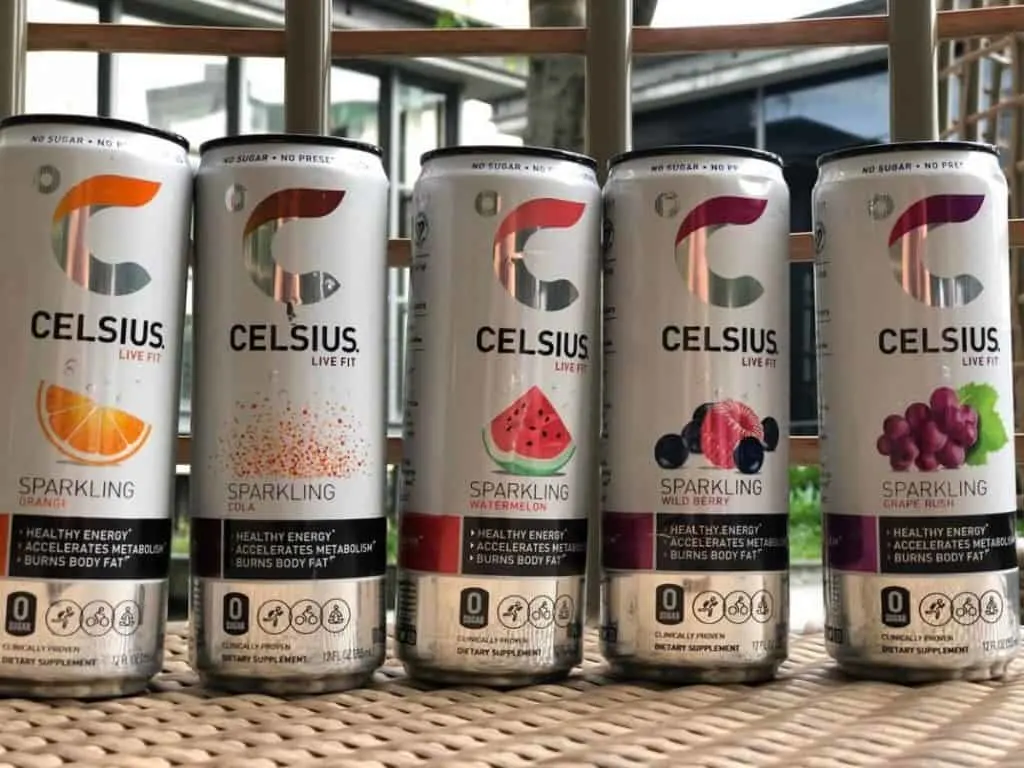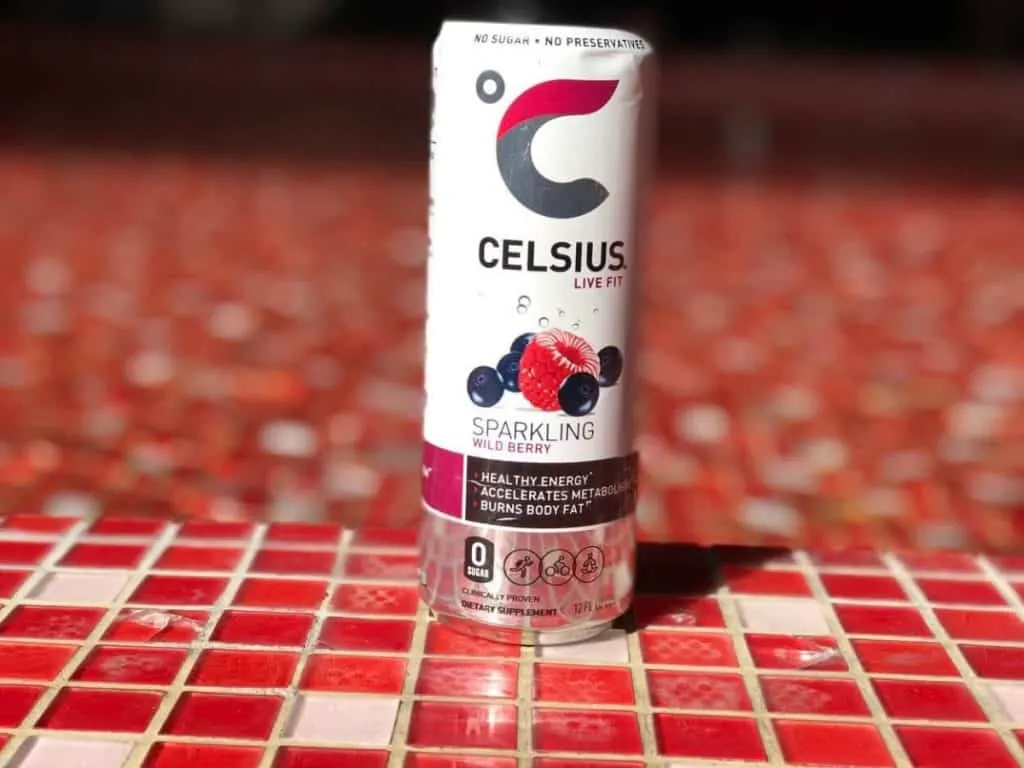Straightforward Answer: Celsius is totally gluten-free. In fact, according to their website, Celsius is certified gluten-free, kosher, and non-GMO.
Celsius probably stands out amongst other energy drink brands because of its high-quality ingredients like green tea, guarana, ginger, and other essential vitamins. Plus, the MetaPlus Blend!
Celsius claims that its proprietary “MetaPlus Blend” can burn calories and boost metabolism. But the FDA hasn’t approved such a statement yet.
As a bonus, Celsius does not contain sugar, aspartame, high fructose corn syrup, artificial preservatives, colors, and flavors. It is definitely a fine choice for energy drink lovers out there!
But the central question is, is it really true that Celsius is gluten-free?
Well, let’s find out, shall we?

Page Contents
What are the side effects of CELSIUS energy drink?
There are a couple of side effects for Celsius Energy Drink. It is possible for it to induce adverse effects such as a rapid or irregular heartbeat, sleeplessness, and anxiety. It is strongly discouraged for those under the age of 18.
Is CELSIUS OK to drink every day?
Celsius is not OK to drink every day. It is acceptable for the average person to consume Celsius ocassionally, not each and every day. Even though many of the constituents are water-soluble, excessive use of these beverages might produce diarrhea and nausea.
Celsius Energy Drink Ingredients
For your viewing pleasure, I have created this table to show the ingredients found in different Celsius variants.
| Celsius Heat | Celsius On-the-go | Celsius Originals | Celsius Naturals |
| 1.81 g MetaPlus Proprietary Blend | 1.81 g of MetaPlus Proprietary Blend | 1.81 g of MetaPlus Proprietary Blend | 1.81 g of MetaPlus Proprietary Blend |
| 2 g Citruline | |||
| 300 mcg Biotin | 300 mcg Biotin | 300 mcg Biotin | 300 mcg Biotin |
| 6 mcg Vitamin B12 | 6 mcg Vitamin B12 | 6 mcg Vitamin B12 | 6 mcg Vitamin B12 |
| 2 mg Vitamin B6 | 2 mg Vitamin B6 | 2 mg Vitamin B6 | 2 mg Vitamin B6 |
| 20 mg Niacin | 20 mg Niacin | 20 mg Niacin (Vitamin B3) | 20 mg Niacin |
| 1.7 mg Riboflavin | 1.7 mg Riboflavin | 1.7 mg Riboflavin (Vitamin B2) | 1.7 mg Riboflavin |
| 50 mcg Chromium | 50 mcg Chromium | 50 mcg Chromiun | 50 mcg Chromium |
| 50 mg Calcium | 50 mg Calcium | 50 mg Calcium | 51 mg Calcium |
| 10 mg Pantothenic Acid | 10 mg Pantothenic Acid | 10 mg Pantothenic Acid | 10 mg Pantothenic Acid |
| 60 mg Vitamin C | 60 mg Vitamin C | 60 mg Vitamin C | 60 mg Vitamin C |
| 15 calories | 10 calories | 10 calories | 10 calories |
| 2 g dietary fiber | |||
| 5 mg Sodium |
As you can see, there are no traces of wheat, barley, and rye in the Celsius ingredients. Therefore, it is safe to assume that Celsius is gluten-free. You can check out their site’s FAQ to confirm.
Check out this video discussing the ingredients in Celsius Energy Drink.
What Does Gluten-Free Mean?
For food to be considered gluten-free, it must not contain more than 20 parts per million(ppm) of gluten. This definition was set by the FDA for the purpose of labeling products.
Current technology cannot detect gluten below 20 ppm which is the reason why it is set to 20 ppm rather than zero.
Some research suggests that food and beverages with gluten level of up 20 ppm may not bring forth any adverse effect.
Products with less than 20 ppm carry the following label:
- gluten-free
- no gluten
- without gluten
- free of gluten
Bear in mind that gluten-free food does not have to carry the “gluten-free” label, but can do so as long as the FDA requirements are met.
Why Gluten Could Be Bad For You?
From my perspective, gluten is not bad or healthy, depending on your state of health.
Going gluten-free is a trend these days but there is confusion if following such a diet is good or bad for your health.
It is totally right to go gluten-free if you have been diagnosed with celiac disease or if you happen to be gluten sensitive.
On the contrary, removing gluten from your diet eliminates the source of carbohydrates needed for a balanced meal. So, if you want to eat healthier, a gluten-free diet may not be right for you. Talk to your doctor.
But in the health and wellness world, everyone is encouraged to go gluten-free regardless of whether or not you are gluten sensitive.
With that in mind, your take on whether gluten could be bad for you depends on your current health condition.
Gluten-Related Health Issues
Celiac disease, wheat allergy, IBS, and gluten intolerance are the most common gluten-related health issues.
To put things in perspective, one in 133 Americans are diagnosed with celiac disease. Also, gluten sensitivity affects 6 to 7% of the US population.
Now, onto the short overview of these health conditions!
Celiac Disease
Celiac disease is also known as gluten-sensitive enteropathy or celiac sprue which is an immune reaction to eating gluten.
The gluten triggers an immune response in the small system which can cause damage on lining preventing it to absorb nutrients.
The damage in the intestine can cause:
- diarrhea
- bloating
- fatigue
- weight loss
- anemia
Unfortunately, celiac disease is not treatable. It is important to follow a gluten-free diet to manage the symptoms of these condition.
Gluten-Sensitivity
People with gluten sensitivity are those who tested negative for celiac disease but still have an intolerance to digesting gluten-derived grains.
Gluten sensitivity or gluten tolerance is an adverse reaction to gluten. It has similar symptoms as celiac disease, but do not confuse it because it has different effects. The only way to differentiate celiac disease and gluten sensitivity is to undergo antibodies test.
Some of the symptoms associated with gluten sensitivity includes:
- bloating
- abdominal pain
- nausea
- constipation
- brain fog
If you think that you are gluten sensitive, you should definitely follow a gluten-free diet. However, consuming gluten once in a while not affect you that bad, as long as you’re not diagnosed with celiac disease.
Wheat Allergy
Wheat allergy is the allergic reaction to any food that contains wheat.
People with wheat allergy require immediate attention especially when anaphylaxis occurs. At this point, blood pressure falls which could lead to unconsciousness, and in some cases, the breathing stops.
You’re likely to develop the following symptoms few minutes after eating wheat:
- hives
- swelling
- breathing difficulty
- nasal congestion
- headache
If someone is showing signs of anaphylaxis, call 911 or your local emergency number. Anaphylaxis is a wheat allergy symptom that immediately requires medical attention.
Irritable Bowel Syndrome (IBS)
IBS is a condition that affects the large intestine. It is usually a lifelong problem that can impact your everyday life.
There is no cure but going gluten-free, healthy lifestyle, stress management, and medication can help manage the symptoms of IBS.
Symptoms of IBS differs from person to person and some of them are:
- constipation
- diarrhea
- cramping
- abdominal pain
If you think you have IBS, I recommend keeping track of the food that you eat and share the information with the doctor for a better diagnosis.
Celsius Caffeine Content
The caffeine content of Celsius Energy Drinks ranges from 200 to 300 mg.
Celsius “Heat” contains about 300 mg of caffeine which is pretty close to the recommended level of intake per day. The FDA set 400 mg as the daily caffeine intake for healthy individuals.
Going past the caffeine limit can result in overdose and these are the symptoms:
- insomnia
- weight gain
- irregular heartbeat
- irritability
- headache
- nausea
- restlessness
But you may not notice any of these symptoms as we all have different reactions to caffeine. You’ll probably be fine after drinking a can. Keep in mind to drink in moderation to stop any of these symptoms from occurring.
Is Celsius Sugar-Free?
Celsius Energy Drink contains zero sugar but it uses the artificial sweeteners sucralose, stevia, and erythritol.
Erythritol is a type of carbohydrate called sugar alcohol used as a sugar substitute. It is naturally found in some food and is also used to make wine, cheese ferment, and beer.
Sucralose is a zero-calorie artificial sweetener that is 400 to 700 times sweeter than sugar. It has no bitter aftertaste, unlike other sweeteners which make it a common ingredient in food and beverages.
Stevia is sourced from the leaves of the stevia plant. It is 100 to 300 times sweeter than table sugar without the carbohydrates, calories, and artificial ingredients.
Stevia and erythritol are used to replace sugar in Celsius Naturals and Celsius On-the-go respectively.

Although these artificial sweeteners are approved by the FDA for general use, there are still some disputes linked to them.
That being said, you should limit your intake of anything that has artificial sweeteners for health reasons. However, a can of Celsius once in a while won’t probably hurt you in any way!
Can Celsius Energy Drink Make You Feel Sick?
Yes, too much Celsius or any energy drink can make you feel sick.
Excessive consumption can upset the balance of acid in your stomach which can cause heartburn and irritate your stomach lining and gut. It can cause cramps, vomiting, and diarrhea in some people.
In my opinion, the best way to avoid feeling sick due to energy drink consumption is to learn how to listen to your body. If you think that it is giving you discomfort, stop drinking!
Also, if you’re following a gluten-free diet, it is best to look for the “gluten-free” label before consuming any drink.
Are all energy drinks gluten-free?
While many energy drinks are formulated without gluten-containing ingredients, there are some that might include additives or other components that could potentially contain gluten.
So, if you’re following a gluten-free diet or have gluten sensitivities, it’s important to read the labels or check with the manufacturer to make sure the energy drink you’re eyeing is gluten-free.
Why is Celsius not FDA approved?
Celsius is classified as a dietary supplement rather than a conventional food or beverage, which is why it does not require FDA approval. Dietary supplements fall under a different set of regulations compared to traditional food and drinks.
While Celsius does not have FDA approval, it is produced in accordance with FDA guidelines to ensure consumer safety and compliance.
Alternatives to Celsius Energy Drink
Conclusion
Overall, Celsius is an excellent choice, not just for people who are on a gluten-free diet, but for individuals looking for an energy booster that promises to deliver its benefits.
Celsius Energy Drink can be considered a safe drink for people with gluten intolerance, wheat sensitivity, celiac disease, and IBS.
I would say following a gluten-free diet has its own perks and downsides which are sometimes misinterpreted by all.
One of the perks is that it is effective in managing symptoms of gluten-related conditions. The downside is, it is not an ideal diet plan if you want to eat healthier.
As for my final verdict, Celsius is indeed gluten-free. There is no indication of wheat, barley, and rye on the ingredients.
If you want to feel refreshed and energized, while keeping a gluten-free diet, I would definitely recommend it!
Before buying Celsius online, be sure to check out my Celsius buying guide so you get the best possible deal.
